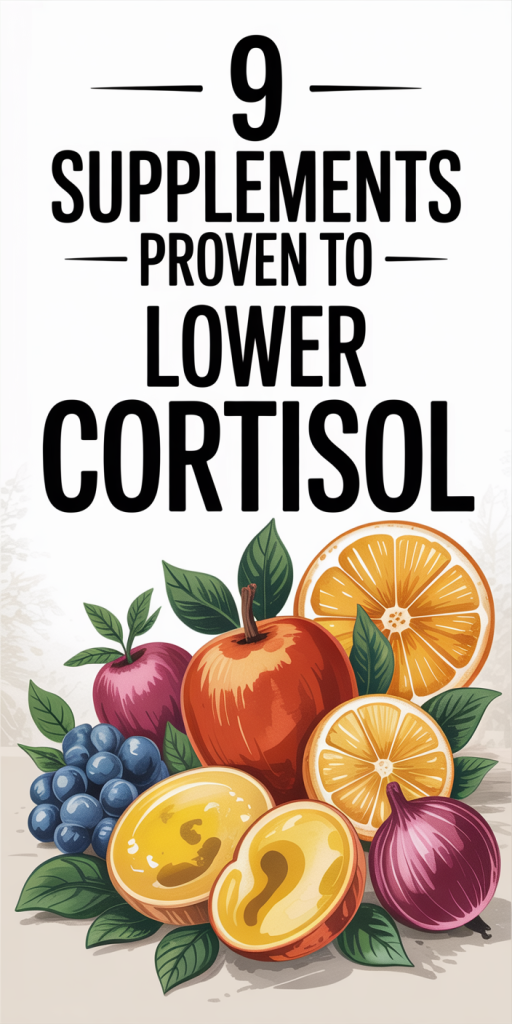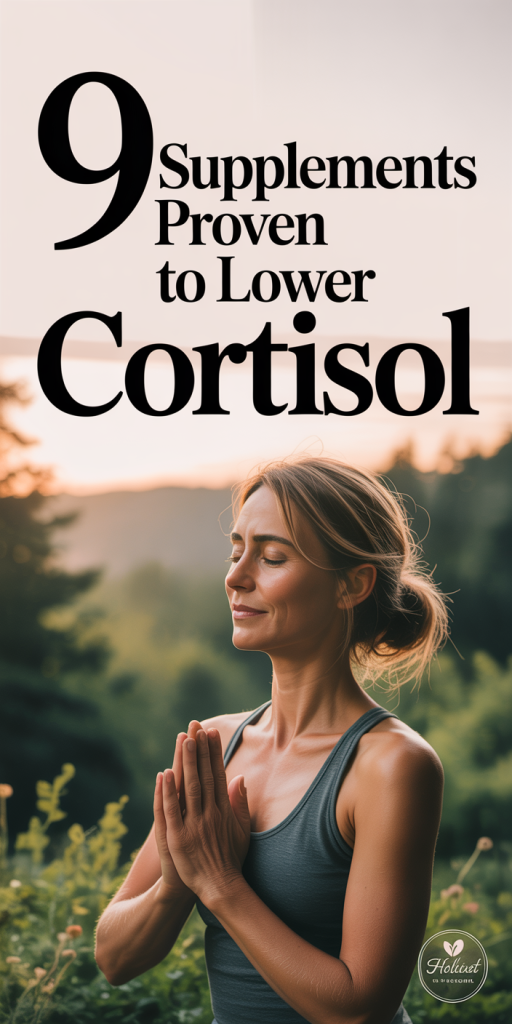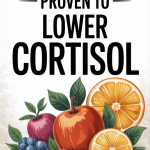9 Supplements Proven to Lower Cortisol
Cortisol, often called the “stress hormone,” is a vital steroid hormone produced by your adrenal glands. It plays a crucial role in regulating your body’s stress response, metabolism, immune function, and blood pressure. While essential for survival, chronically elevated cortisol levels due to prolonged stress can have detrimental effects on your health, leading to issues like weight gain, high blood pressure, weakened immunity, and sleep disturbances. Fortunately, several natural supplements have been scientifically proven to help lower cortisol levels and mitigate the negative impacts of stress. This article explores nine of the most effective supplements, backed by research, that can help you manage your cortisol and improve your overall well-being.
1. Ashwagandha (Withania somnifera)
Ashwagandha is an ancient medicinal herb classified as an adaptogen, meaning it helps your body manage stress. Its stress-relieving properties are well-documented, with numerous studies demonstrating its ability to significantly reduce cortisol levels. A 2019 study published in Medicine (Baltimore) found that participants taking 240mg of a standardized ashwagandha extract (Shoden) daily for 60 days experienced a significant reduction in morning cortisol levels compared to the placebo group [1]. Another study from 2012 showed that chronically stressed adults who took 300mg of ashwagandha root extract twice daily for 60 days had a 27.9% reduction in serum cortisol levels [2].
How it Works
Ashwagandha’s cortisol-lowering effects are attributed to its ability to modulate the hypothalamic-pituitary-adrenal (HPA) axis, which is the body’s central stress response system. By regulating the HPA axis, ashwagandha helps to reduce the overproduction of cortisol in response to stress. It also exhibits anxiolytic (anti-anxiety) properties, further contributing to its stress-reducing effects.
Dosage and Safety
- Dosage: 240-600mg of a standardized root extract per day, often divided into two doses.
- Safety: Generally considered safe for most people. However, it may not be suitable for pregnant or breastfeeding women, or individuals with autoimmune diseases. Always consult with a healthcare provider before starting any new supplement.

2. Phosphatidylserine (PS)
Phosphatidylserine is a phospholipid and a vital component of cell membranes, particularly in the brain. It has been shown to be effective in blunting the cortisol response to physical and mental stress. A 2008 study in the Journal of the International Society of Sports Nutrition found that 600mg of phosphatidylserine per day for 10 days reduced serum cortisol levels by 39% in healthy males after moderate-intensity exercise [3]. Another study showed that 800mg of PS daily for 10 days reduced the cortisol response to acute stress by 20% in healthy adults [4].
How it Works
Phosphatidylserine appears to work by modulating the release of ACTH (adrenocorticotropic hormone), a hormone that stimulates the adrenal glands to produce cortisol. By blunting the ACTH response, PS helps to reduce the amount of cortisol released during stressful situations. It also supports cognitive function and may improve mood, which can indirectly help to manage stress.
Dosage and Safety
- Dosage: 400-800mg per day, often divided into two or three doses.
- Safety: Generally well-tolerated. High doses may cause mild gastrointestinal upset. As with any supplement, it is best to consult with a healthcare professional before use.
3. Holy Basil (Ocimum tenuiflorum)
Holy Basil, also known as Tulsi, is a revered herb in Ayurvedic medicine with powerful adaptogenic properties. It has been shown to be highly effective in reducing both psychological and physiological stress. A groundbreaking 2022 study published in Frontiers in Nutrition demonstrated that supplementation with a standardized Holy Basil extract (Holixer™) for 8 weeks resulted in a remarkable 36% reduction in hair cortisol levels, a measure of chronic cortisol exposure [5]. The study also found that Holy Basil supplementation buffered the stress response to a standardized stress test, leading to significantly lower salivary cortisol levels.
How it Works
Holy Basil’s stress-reducing effects are attributed to its ability to modulate the HPA axis and its influence on neurotransmitter systems. It helps to normalize cortisol levels and has been shown to have a calming effect on the central nervous system. Its antioxidant and anti-inflammatory properties also contribute to its overall health benefits.
Dosage and Safety
- Dosage: 250-500mg of a standardized extract per day, often divided into two doses.
- Safety: Generally considered safe. It may have a mild blood-thinning effect, so individuals on anticoagulant medications should consult their doctor. It is not recommended for pregnant or breastfeeding women.

4. Rhodiola Rosea
Rhodiola rosea is another potent adaptogenic herb that has been used for centuries to combat fatigue and enhance resilience to stress. Research has shown that Rhodiola can help to balance cortisol levels and improve mental performance under stress. A 2009 study found that Rhodiola extract SHR-5 reduced cortisol levels and improved cognitive function in individuals with stress-related fatigue [6]. While some studies have shown mixed results, the overall body of evidence supports Rhodiola’s role in stress management.
How it Works
Rhodiola works by influencing key mediators of the stress response, including cortisol, nitric oxide, and stress-activated protein kinases. It helps to enhance the body’s ability to adapt to stress and can improve energy metabolism, leading to reduced fatigue and improved mental clarity.
Dosage and Safety
- Dosage: 200-600mg of a standardized extract (containing 3% rosavins and 1% salidroside) per day.
- Safety: Generally safe, but may cause mild side effects such as dizziness or dry mouth. It is best to take it earlier in the day to avoid any potential interference with sleep.
5. Omega-3 Fatty Acids
Omega-3 fatty acids, found in fish oil and certain plant sources, are well-known for their anti-inflammatory properties. They have also been shown to help reduce cortisol levels and mitigate the negative effects of stress. A 2021 study found that omega-3 supplementation for 8 weeks significantly reduced morning cortisol levels and symptoms of emotional exhaustion in a group of stressed individuals [7].
How it Works
Omega-3s help to reduce inflammation throughout the body, which can in turn help to lower cortisol levels. They also play a role in brain health and neurotransmitter function, which can improve mood and reduce the perception of stress.
Dosage and Safety
- Dosage: 1,000-2,000mg of combined EPA and DHA per day.
- Safety: Generally safe, but high doses may have a blood-thinning effect. It is important to choose a high-quality, purified fish oil supplement to avoid contaminants like mercury.
6. Magnesium
Magnesium is an essential mineral that plays a role in over 300 enzymatic reactions in the body, including the stress response. It is often referred to as the “relaxation mineral” due to its calming effects on the nervous system. Research has shown that magnesium can help to regulate cortisol levels and improve sleep quality. A 2011 study found that magnesium supplementation helped to reduce serum cortisol levels and improve sleep in elderly individuals [8].
How it Works
Magnesium helps to maintain the balance of the HPA axis and can inhibit the release of ACTH, which in turn reduces cortisol production. It also binds to and stimulates GABA receptors in the brain, which has a calming effect and helps to reduce anxiety and stress.
Dosage and Safety
- Dosage: 200-400mg of a highly bioavailable form of magnesium, such as magnesium glycinate or citrate, per day.
- Safety: Generally safe, but high doses can cause diarrhea. Individuals with kidney problems should consult their doctor before supplementing with magnesium.
7. L-theanine
L-theanine is an amino acid found primarily in green tea. It is known for its ability to promote relaxation and reduce stress without causing drowsiness. Research has shown that L-theanine can help to lower cortisol levels and improve cognitive function under stress. A 2007 study found that 200mg of L-theanine reduced the cortisol response to a multitasking cognitive stressor [9].
How it Works
L-theanine increases the levels of calming neurotransmitters like GABA, serotonin, and dopamine in the brain. It also blocks the binding of L-glutamic acid to glutamate receptors, which can have an excitatory effect on the brain. This combination of actions helps to promote a state of calm focus and reduce the physiological stress response.
Dosage and Safety
- Dosage: 100-200mg per day, as needed for stress relief.
- Safety: Generally considered safe, with no significant side effects reported.
8. Magnolia Bark (Magnolia officinalis)
Magnolia bark, often combined with Phellodendron amurense in the proprietary blend Relora®, is a traditional remedy for stress and anxiety. A 2013 study in the Journal of the International Society of Sports Nutrition found that this combination reduced salivary cortisol levels by 18% in moderately stressed individuals after 4 weeks of supplementation [10]. The supplement also led to significant improvements in mood, including a 42% reduction in anger and a 31% reduction in fatigue.
How it Works
Magnolia bark contains bioactive compounds such as magnolol and honokiol, which have anxiolytic and calming properties. These compounds are thought to modulate the activity of GABA receptors in the brain and may also have a direct effect on the HPA axis, helping to reduce cortisol production.
Dosage and Safety
- Dosage: 250-500mg of a standardized extract (such as Relora®) per day, often divided into two doses.
- Safety: Generally considered safe for short-term use. It may cause drowsiness, so it is best to avoid taking it with other sedatives. Not recommended for pregnant or breastfeeding women.
9. GABA (Gamma-Aminobutyric Acid)
GABA is an inhibitory neurotransmitter in the brain that plays a key role in reducing neuronal excitability. It is known for its calming effects and is often used to promote relaxation and sleep. While more research is needed, some studies suggest that GABA supplementation may help to lower cortisol levels. A 2020 study in Frontiers in Neuroscience noted that GABA administration has been shown to have stress-reducing and sleep-enhancing effects, with some studies reporting trends for reduced blood cortisol levels [11].
How it Works
GABA works by binding to GABA receptors in the brain, which reduces nerve cell hyperactivity and promotes a sense of calm. By reducing the overall stress response, GABA may indirectly help to lower cortisol levels.
Dosage and Safety
- Dosage: 100-500mg per day, as needed for relaxation.
- Safety: Generally considered safe, but its effectiveness as an oral supplement is still being debated due to questions about its ability to cross the blood-brain barrier.

Conclusion
Managing chronic stress and elevated cortisol levels is crucial for maintaining long-term health. While lifestyle interventions such as exercise, mindfulness, and a healthy diet are foundational, the supplements discussed in this article can provide additional support. From the potent adaptogenic effects of Ashwagandha and Holy Basil to the cortisol-blunting power of Phosphatidylserine, these nine supplements offer a range of natural options for mitigating the negative impacts of stress. As always, it is essential to consult with a healthcare professional before beginning any new supplement regimen to ensure it is appropriate for your individual needs and health status.
References
- Lopresti, A. L., Smith, S. J., Malvi, H., & Kodgule, R. (2019). An investigation into the stress-relieving and pharmacological actions of an ashwagandha (Withania somnifera) extract: A randomized, double-blind, placebo-controlled study. Medicine (Baltimore), 98(37), e17186. https://pmc.ncbi.nlm.nih.gov/articles/PMC6750292/
- Chandrasekhar, K., Kapoor, J., & Anishetty, S. (2012). A prospective, randomized double-blind, placebo-controlled study of safety and efficacy of a high-concentration full-spectrum extract of ashwagandha root in reducing stress and anxiety in adults. Indian journal of psychological medicine, 34(3), 255–262. https://www.ncbi.nlm.nih.gov/pmc/articles/PMC3573577/
- Starks, M. A., Starks, S. L., Kingsley, M., Purpura, M., & Jäger, R. (2008). The effects of phosphatidylserine on endocrine response to moderate intensity exercise. Journal of the International Society of Sports Nutrition, 5, 11. https://pmc.ncbi.nlm.nih.gov/articles/PMC2503954/
- Hellhammer, J., Fries, E., Buss, C., Engert, V., Tuch, A., Rutenberg, D., & Hellhammer, D. (2004). Effects of soy lecithin phosphatidic acid and phosphatidylserine complex (PAS) on the endocrine and psychological responses to mental stress. Stress (Amsterdam, Netherlands), 7(2), 119–126. https://pubmed.ncbi.nlm.nih.gov/15512856/
- Lopresti, A. L., Smith, S. J., Metse, A. P., & Drummond, P. D. (2022). A randomized, double-blind, placebo-controlled trial investigating the effects of an Ocimum tenuiflorum (Holy Basil) extract (HolixerTM) on stress, mood, and sleep in adults experiencing stress. Frontiers in nutrition, 9, 965130. https://pmc.ncbi.nlm.nih.gov/articles/PMC9524226/
- Olsson, E. M., von Schéele, B., & Panossian, A. G. (2009). A randomised, double-blind, placebo-controlled, parallel-group study of the standardised extract shr-5 of the roots of Rhodiola rosea in the treatment of subjects with stress-related fatigue. Planta medica, 75(2), 105–112. https://pubmed.ncbi.nlm.nih.gov/19016404/
- Thesing, C. S., Bot, M., Milaneschi, Y., Giltay, E. J., & Penninx, B. (2021). The effects of omega-3 fatty acid supplementation on depressive symptoms and cortisol in a stressed, non-depressed population. The international journal of neuropsychopharmacology, 24(11), 895–904. https://www.ncbi.nlm.nih.gov/pmc/articles/PMC8597468/
- Abbasi, B., Kimiagar, M., Sadeghniiat, K., Shirazi, M. M., Hedayati, M., & Rashidkhani, B. (2012). The effect of magnesium supplementation on primary insomnia in elderly: A double-blind placebo-controlled clinical trial. Journal of research in medical sciences : the official journal of Isfahan University of Medical Sciences, 17(12), 1161–1169. https://www.ncbi.nlm.nih.gov/pmc/articles/PMC3703169/
- Kimura, K., Ozeki, M., Juneja, L. R., & Ohira, H. (2007). L-Theanine reduces psychological and physiological stress responses. Biological psychology, 74(1), 39–45. https://pubmed.ncbi.nlm.nih.gov/16930802/
- Talbott, S. M., Talbott, J. A., & Pugh, M. (2013). Effect of Magnolia officinalis and Phellodendron amurense (Relora®) on cortisol and psychological mood state in moderately stressed subjects. Journal of the International Society of Sports Nutrition, 10(1), 37. https://pmc.ncbi.nlm.nih.gov/articles/PMC3750820/
- Hepsomali, P., Groeger, J. A., Nishihira, J., & Scholey, A. (2020). Effects of Oral Gamma-Aminobutyric Acid (GABA) Administration on Stress and Sleep in Humans: A Systematic Review. Frontiers in neuroscience, 14, 923. https://www.frontiersin.org/articles/10.3389/fnins.2020.00923/full







